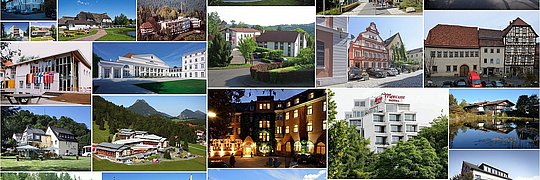
‘Check-in Energy Efficiency’ pilot project
dena analysed the energy savings potential in the hotel and hostel accommodation sector and how it could be exploited in the pilot project.
Specific refurbishment projects could serve as examples of what an economically viable and environmentally and socially sustainable concept for the hostel of the future could look like.
The challenge
According to the German Hotel and Restaurant Association (DEHOGA), high energy costs are one of the main problems faced by hotel operators.
Hence, the potential for savings is correspondingly significant. However, it is not always possible to make drastic changes; after all, it is important to maintain ongoing operations at the same time. Many hotel operators simply do not have the time to deal with the issue of energy efficiency, and not everyone has the necessary expertise or knows the savings potential of their establishment. Often, much can be achieved with just small measures.
What we have done:
We have identified the potential savings for ten hostels and 24 hotels, covering the entire market, over several years. dena supported the participants in various phases as the point of contact for technical matters, organised regular meetings for dialogue and networking, informed the public about the project and advised the hosts on communication with staff and guests.
The project began with an energy consultation by a qualified energy efficiency expert, who took a close look at the company and drew up a comprehensive refurbishment roadmap. This was followed by the implementation phase by the hotel owners. What worked, and what did not work so well? At the end of the project, the results were evaluated and further optimisations were discussed. After completion of the efficiency measures, the measured energy consumption was analysed by scientific methods as part of the ‘Energieoptimiertes Bauen’ (Energy-optimised building) research project.
The overall outcome
Around half of the participating hotels and hostels were able to plan and implement measures and in turn gradually realise their vision of a more sustainable accommodation. At the same time, the ‘Check-in Energy Efficiency’ pilot project has shown that investments in energy efficiency and renewable energies are influenced by many factors and are not a sure-fire success. It is advisable to present these topics under the umbrella term of sustainability and to take into account the industry-specific characteristics when communicating with the people involved in order for even more hotels and hostels to become ambassadors and multipliers of progress in terms of energy efficiency.
The Federal Ministry for Economic Affairs and Climate Action and the KfW Group supported the pilot project. Daikin, Viessmann and the ‘Energy-optimised building’ research project were the partners from industry and science.
Video gallery



Let us know if we can help!
-
 © HoffotografenHeike Marcinek
© HoffotografenHeike MarcinekLeiterin Arbeitsgebiet Innovation & Transformation T: +49 30 66 777 - 761 heike.marcinek(at)dena.de